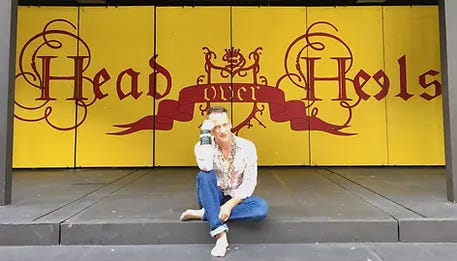Grand Theft Musical: Introduction
A Compaint o the Attorney Grievance Committee of the First Appellate Division of the State Supreme Court of New York.
January 10, 2023
To the Attorney Grievance Committee,
My name is Jeffrey Whitty. I make my living as a storyteller in the entertainment field. My work includes the 2004 Broadway musical Avenue Q, for which I received a Tony Award for Best Book of a Musical, as well as the 2018 film Can You Ever Forgive Me? for which I was recognized with Best Adapted Screenplay awards from the Writers Guild of America and the Independent Spirit Awards, as well as Oscar and BAFTA nominations.
I hereby lodge a complaint against attorney Conrad Rippy of the Levine, Plotkin and Menin law firm in New York City (LPMNY). I began working with Mr. Rippy on a contingency basis in 2003 in a reasonable expectation of fiduciary obligation. His behavior proved anything but as he betrayed my fiduciary trust, fostering deceptive and unethical conflicts within his firm, in order to gather power and money for himself in the Broadway industry.
On a less-egregious level, I wish to bring to your attention Susan Mindell, also of Levine, Plotkin and Menin, who participated in Mr. Rippy’s deceptive practices.
Exploitation is defined by the Oxford English Dictionary as “The action or fact of treating someone unfairly in order to benefit from their work.” As I learned firsthand, exploitation is brutal abuse - for the target is punished for the crime of doing well.
And in my case, I did very well. In June 2015, after three years of rigorous, grueling effort, I opened a musical theater property called Head Over Heels at the Oregon Shakespeare Festival in Ashland. I wrote the book, which is the script, dialogue and story architecture of the musical. For the score, I drew from the catalog of 80’s rockers the Go-Go’s.
The June 2015 production of Head Over Heels was a trial run to develop the show for Broadway - a necessary, essential step in development. The production proved wildly successful with audiences, receiving the most passionate response of my career.
I needed this revenue to survive because my finances were dwindling after years of projects that didn’t take off. Such ups and downs are par for the course in my industry – but when I create a hit after years of non-starters, I need my attorneys to protect me rather than betray my trust to benefit themselves. I work for an income, not for the glory and revenue of fiduciaries whom I employ for protection.
Within a week of my June 2016 opening night in Oregon, delighted word-of-mouth sold out the entire five-month run of Head Over Heels. In the show’s closing weeks, hopeful audience members lined up outside the theater in hopes of snagging a spare ticket.
On opening night, my agent, John Buzzetti of the William Morris Endeavor Agency, declared that Head Over Heels was “going to run forever.”
In a July 6, 2015 email after my opening night, Conrad Rippy wrote me an email with Buzzetti cc-ed:
I know, and the Go-Go’s most certainly know, how terrific Head Over Heels is, and what an incredible accomplishment. As John, who I am sure is listening, said to you on the Monday after the opening: it’s a work of genius.
Given the show’s success, and given the further improvements I planned for Broadway, my financial future seemed secure. Alas, I did not know that in my 2013 contract with producers, my lawyer and agent intentionally removed my creative control, seizing my consent over the fortunes of my work, to enrich themselves in an industry where a hit musical property can be worth over a billion dollars nowadays.
A billion-plus dollars. Please remember the value of a hit musical as the ensuing abuses escalate to astonishing heights.
Among many other top-grossing musicals, Rippy’s firm of Levine, Plotkin & Menin is production counsel for the smash musical Hamilton. My agent John Buzzetti represents the majority of Hamilton's creative team as well as many other big hitters. They hold tremendous power in the industry.
Years before, when I chose my collaborators on my creative team – specifically the positions of DIRECTOR and MUSIC DIRECTOR - I did not happen to select any of my agent John Buzzetti’s clients. I chose colleagues whom I found best suited to the show’s mashup of classical theater (I wrote the script in rigorous iambic pentameter, loosely based on a book from 1580) and modern sensibilities (drawing from the catalog of the Go-Go’s with such care that many audience members assumed that the music was written for the show).
Sensing a burgeoning hit, Buzzetti wanted his artists on my creative team at any cost, and he worked with Mr. Rippy beyond my view in order to achieve his goal of supremacy.
“Agency packaging” is a contentious issue in the entertainment field, typically discussed in the world of film. When an agent “packages” a project, they bundle their other clients on a given property. My 2012 Broadway musical Bring It On was arguably packaged, as Mr. Buzzetti represented the bulk of the creative team, but in that instance the packaging occurred before a word was written – and moreover, the clients were up to the task. It was a happy collaboration with no bumps.
Alas, Broadway's Head Over Heels took agency packaging to a ruinous extreme. When Buzzetti recognized the giddy crowd response on my opening night, he proceeded to bully and manipulate his way into packaging a show already three years in development. All of my collaborators were fired with no reason given, and their work was pulled. Major sections of the show that worked wonderfully before the crowd - the result of years of effort - were jettisoned. Clients of my agent seized the slots of my unjustly fired collaborators. Alas, these clients proved ill-suited to the task.
In tandem, my attorney Conrad Rippy also commandeered control over my art by quietly representing all sides of the contract in flagrant violation of Rule 1.7 of the New York Rules of Professional Conduct.
Eighteen months after the most successful opening night of my career, ownership of my hard-won property belonged to clients of my lawyer and agent without my consent, as I weathered a rain of abusive behavior designed to intimidate me and keep me at heel.
Artists depend on our representatives to protect us. But when the predators are the artist's representatives, the artist is left undefended, in free-fall, scrambling in mid-air, vulnerable to exploitation across the board.
Art is more than just property – it is the artist’s self-expression. To steal and then destroy an artist’s work is a deeply personal violation. The theft and vandalism of my art was a devastating blow to my career, my mental health - and as the abuse escalated to intimidating threats from strangers, my basic sense of personal safety as I moved about the world.
As a veteran in the field, I am certain that if all aboard Head Over Heels behaved ethically and remained in their professional areas, we’d have enjoyed a hit and the revenue that rains down. I’ve written a sturdy hit before, after all: Avenue Q, which ran for sixteen years in New York City.
Head Over Heels showed every sign of being my second broad-market success – until my lawyer and agent opportunistically portrayed my work as a failure that could only be saved by packaging the show with my agent’s clients. Meanwhile, my attorney worked beyond my view to hand my property to wealthy and celebrity clients also on his firm’s roster.
It is a complicated story that starts small – with a few customary rights removed from my contract without my knowledge nor consent – and escalates to an astonishing degree, leading to one of Broadway’s biggest flop enterprises: a baffling, critically-panned, audience-allergic musical that ran for 28 weeks at a loss every single week.
The exploitation of me grew so extreme that it demanded an elaborate gaslighting cover-up involving outside parties. It brings me no pleasure to hold the receipts, nor to tell the story now. For as you shall understand, speaking out is a risk.
The position of whistleblower is awful. Every choice feels hopeless, especially when the abuse is ongoing. Does one speak out and risk retribution? Or does one remain silent in hopes that the abuse will subside, despite all evidence to the contrary?
For reasons that shall become clear, today I have no choice but to speak out, which will likely be the death knell to a once-flourishing career that I built from square one.
I arrived in New York City on July 26th 1993 on a bus from Oregon with no professional connections - just two suitcases, two grand in my pocket and dreams of making a living in the theater. Ten years and five days later, Avenue Q opened on Broadway. Every step up the ladder to that moment was the result of tremendous struggle, moxie, weathering manifold failures plus the grind of earning enough money to survive.
It is one of this story’s many ironies that 25 years to the day after I arrived in New York City on July 26th, 2018, a musical called Head Over Heels opened at the Hudson Theater on Broadway, bearing my name and the tagline “From the mind that brought you Avenue Q.”
But the body of the artist was not present, nor was my rigorously audience-attentive work. I was pointedly excluded from the opening night festivities. The show that played on that Broadway stage was a disgraceful, amateurish vandalism of the creative property that I quit two years before in an attempt to escape the escalating abuse.
On their opening night, not one person aboard the Broadway opening reached out to recognize me for creating Head Over Heels. There was no acknowledgment that there would be no show at all if I’d not created it in the first place, at no small expense to myself. Rippy and Buzzetti made certain that I was shunned, sneered at across the industry - lest my presence unravel their spiteful web of lies and put their careers at risk.
I was afraid to begin this document lest it trigger more intimidation on its release. It has taken me hundreds of hours to compile the heavily-sourced true story that follows.
If left unchecked, I believe that such treatment may well kill an artist some day, driving them to self-harm as they struggle undefended amidst a nonstop storm of exploitation:
“Mistreating someone in order to profit from their work.”
The scales of Justice have been morbidly askew for nearly a decade. All the while I stood entirely alone against the entertainment industry’s most powerful talent agency, one of Broadway’s biggest law firms, and a bevy of producers and celebrities with boundless money - and contempt fostered by my former fiduciaries.
The men I employed as my advocates, defenders and voice in the industry instead led the depiction of me as a mark to be destroyed and discarded when I tried to stand up for myself with no one in my corner. They used their role as my voice in order to puppeteer me into saying things 180 degrees opposite of my intent.
The truth cannot be assailed.
Lies require tending.
What makes me a target is also my shield: I hold the truth.
And I tell it here, warts and all, in one final hope that the lies may perish and the scales of Justice find balance once more.
Sincerely,
Jeffrey Whitty
###




